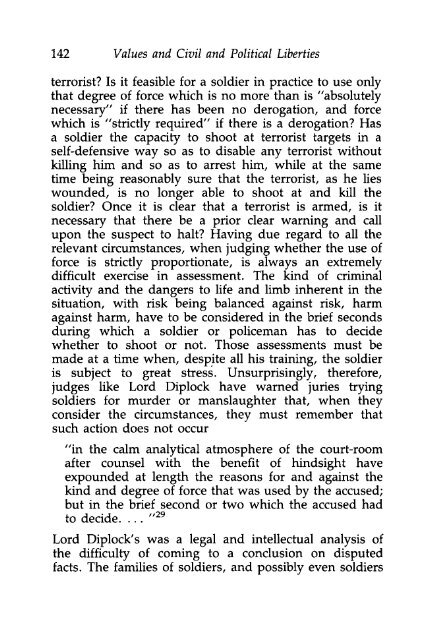The United Kingdom and Human Rights - College of Social ...
The United Kingdom and Human Rights - College of Social ...
The United Kingdom and Human Rights - College of Social ...
You also want an ePaper? Increase the reach of your titles
YUMPU automatically turns print PDFs into web optimized ePapers that Google loves.
142 Values <strong>and</strong> Civil <strong>and</strong> Political Liberties<br />
terrorist? Is it feasible for a soldier in practice to use only<br />
that degree <strong>of</strong> force which is no more than is "absolutely<br />
necessary" if there has been no derogation, <strong>and</strong> force<br />
which is "strictly required" if there is a derogation? Has<br />
a soldier the capacity to shoot at terrorist targets in a<br />
self-defensive way so as to disable any terrorist without<br />
killing him <strong>and</strong> so as to arrest him, while at the same<br />
time being reasonably sure that the terrorist, as he lies<br />
wounded, is no longer able to shoot at <strong>and</strong> kill the<br />
soldier? Once it is clear that a terrorist is armed, is it<br />
necessary that there be a prior clear warning <strong>and</strong> call<br />
upon the suspect to halt? Having due regard to all the<br />
relevant circumstances, when judging whether the use <strong>of</strong><br />
force is strictly proportionate, is always an extremely<br />
difficult exercise in assessment. <strong>The</strong> kind <strong>of</strong> criminal<br />
activity <strong>and</strong> the dangers to life <strong>and</strong> limb inherent in the<br />
situation, with risk being balanced against risk, harm<br />
against harm, have to be considered in the brief seconds<br />
during which a soldier or policeman has to decide<br />
whether to shoot or not. Those assessments must be<br />
made at a time when, despite all his training, the soldier<br />
is subject to great stress. Unsurprisingly, therefore,<br />
judges like Lord Diplock have warned juries trying<br />
soldiers for murder or manslaughter that, when they<br />
consider the circumstances, they must remember that<br />
such action does not occur<br />
"in the calm analytical atmosphere <strong>of</strong> the court-room<br />
after counsel with the benefit <strong>of</strong> hindsight have<br />
expounded at length the reasons for <strong>and</strong> against the<br />
kind <strong>and</strong> degree <strong>of</strong> force that was used by the accused;<br />
but in the brief second or two which the accused had<br />
to decide. ... " 29<br />
Lord Diplock's was a legal <strong>and</strong> intellectual analysis <strong>of</strong><br />
the difficulty <strong>of</strong> coming to a conclusion on disputed<br />
facts. <strong>The</strong> families <strong>of</strong> soldiers, <strong>and</strong> possibly even soldiers

















